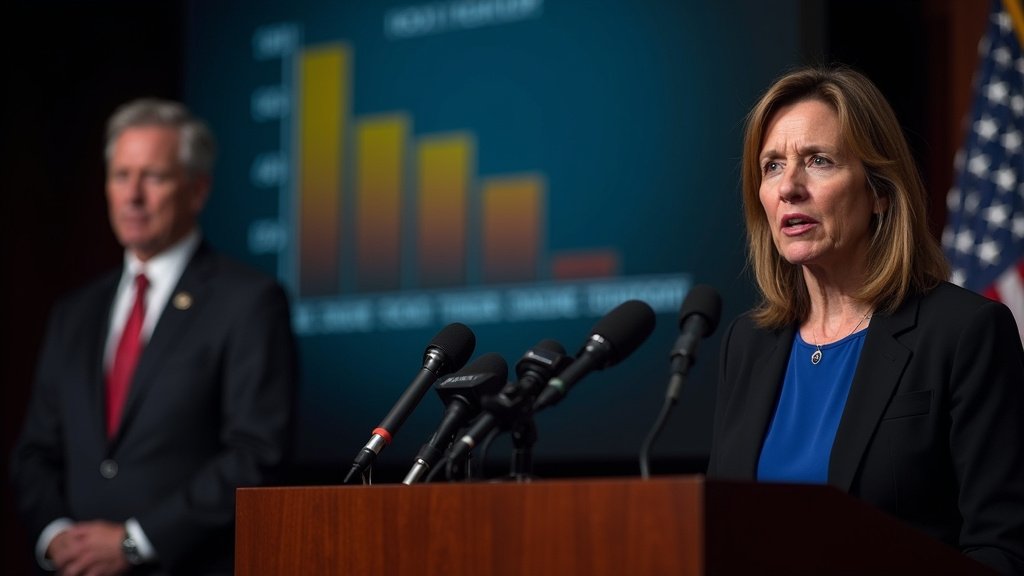EUGENE, OR – Oregon’s Democratic leaders, including U.S. Senator Ron Wyden and U.S. Representative Val Hoyle, held a press conference Saturday, November 1, 2025, to vehemently decry the inaction of the Trump administration amidst a federal government shutdown that has led to the immediate cessation of Supplemental Nutrition Assistance Program (SNAP) benefits for tens of thousands of Oregonians, effectively triggering significant Oregon SNAP Cuts.
As of November 1, over 75,000 residents in Lane County alone lost access to their crucial Oregon SNAP benefits due to a SNAP funding shortage stemming from the ongoing federal budget impasse. This critical halt in aid leaves a significant portion of the state’s vulnerable population facing immediate food security emergency, prompting Governor Tina Kotek to declare a 60-day food security emergency and allocate $5 million to bolster the state’s food bank network. This news highlights a broader national crisis where an estimated one in eight Americans are now uncertain about how they will afford their next meal, exacerbating the existing hunger crisis Oregon is facing.
Federal Shutdown Triggers Devastating Oregon SNAP Cuts
The federal government shutdown, which began in late September 2025, has crippled numerous government functions, but its impact on Oregon SNAP is particularly dire. SNAP, a cornerstone of the nation’s social safety net, is entirely federally funded, and the ongoing budget deadlock has prevented the release of funds for November. State agencies across the country, including Oregon’s Department of Human Services (ODHS), were compelled to halt benefit disbursements due to a lack of federal appropriations, directly impacting Oregon SNAP benefits and leading to these severe Oregon SNAP Cuts.
Senator Ron Wyden sharply criticized the administration’s stance, stating, “Just about everybody is helping with this except Donald Trump. Time for Donald Trump to step up and stop blocking what his own administration says.” He and Representative Hoyle accused the Trump administration of making a deliberate choice not to utilize available contingency funds, which have been used in past shutdowns to maintain program operations. “They could do that, and they’re choosing not to, because the pain is the point,” Representative Hoyle asserted. The Trump administration, however, has claimed the contingency reserve fund is not legally available and has blamed Democrats for the delays in providing Oregon SNAP benefits, further deepening the Oregon SNAP Cuts.
Oregon’s Staggering Numbers and State Response to Oregon SNAP Cuts
Oregon faces a substantial impact from these Oregon SNAP Cuts. The Oregon Department of Human Services estimates that approximately 757,000 people across the state rely on SNAP benefits, representing 17.7% of the state’s population in Fiscal Year 2024. This figure underscores Oregon’s significant reliance on the program, ranking it among the highest states nationally for SNAP participation. More than one in six Oregonians, a demographic including children, working families, seniors, and individuals with disabilities, depend on SNAP to afford groceries, making these Oregon SNAP Cuts particularly devastating.
In response to the impending crisis, Governor Tina Kotek declared a statewide food security emergency. This declaration mobilizes state agencies and resources to coordinate with local governments and non-profits to mitigate the crisis. A significant part of this response includes directing $5 million from unspent Temporary Assistance for Needy Families (TANF) funds to support Oregon’s network of Oregon food banks. These organizations, already strained, are bracing for a surge in demand as hundreds of thousands of residents lose their primary source of food assistance due to the Oregon SNAP Cuts.
Legal Battles and Judicial Intervention Amidst Oregon SNAP Cuts
The federal standoff has spurred legal challenges, with Oregon and Washington joining over two dozen other states in suing the Trump administration to compel the release of SNAP funds. This legal pressure culminated in federal judges ordering the Trump administration to use emergency reserve funds to continue paying SNAP benefits during the shutdown. One ruling stipulated that the U.S. Department of Agriculture must use contingency funding appropriated by Congress, aiming to alleviate the impact of the Oregon SNAP Cuts. This legal intervention was crucial in addressing the immediate crisis of SNAP benefits halted for so many.
Despite these judicial victories, uncertainty lingers regarding the timing and full restoration of Oregon SNAP benefits. Some groups anticipate that it could take weeks for these court orders to translate into actual disbursements on recipients’ EBT cards, leaving many families in a precarious situation heading into the colder months. Oregon Attorney General Dan Rayfield commended the rulings, stating, “Today’s ruling sends a message that no administration can use hunger as a political weapon”, especially in light of the severe Oregon SNAP Cuts.
Broader Implications for Families and the Economy from Oregon SNAP Cuts
The consequences of Oregon SNAP Cuts extend far beyond individual households. Research indicates that children in households with reduced food access are significantly more likely to experience food insecurity, poor health, and developmental delays. The loss of SNAP benefits can force families into making impossible choices between food, rent, and other essential needs, amplifying the food insecurity crisis.
Economically, SNAP plays a vital role. Each dollar in SNAP benefits generates approximately $1.50 to $1.54 in local economic activity, supporting grocery stores, farmers, and related industries. A disruption in these benefits not only harms recipients but also threatens jobs, business revenues, and the overall economic health of communities, a consequence of the ongoing Oregon SNAP Cuts. For small grocers, SNAP purchases can account for up to half of their monthly revenue, putting many at risk of closure due to the SNAP funding shortage.
Oregon leaders have emphasized that the state will continue to support its residents. Governor Kotek’s declaration activates state agencies to provide essential protective measures and financial assistance to those affected by hunger due to the loss of SNAP benefits. The Oregon Department of Human Services continues to update its website with resources for those in need, hoping to mitigate the effects of the Oregon SNAP Cuts.
As the federal government shutdown continues, the situation highlights the deep reliance of millions of Americans, including many in Oregon, on critical safety net programs. The political standoff in Washington, D.C., is directly impacting the ability of families to access basic necessities, underscoring the urgent need for legislative resolution to address the Oregon SNAP Cuts and the broader SNAP funding shortage. The news from this press conference signals a growing crisis that will require sustained attention and action from both state and federal officials to combat the effects of the Oregon SNAP Cuts, especially given the Trump administration inaction that precipitated this situation.




